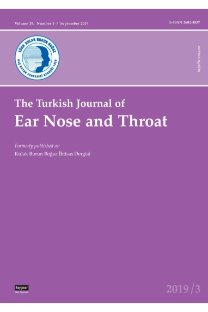Gerçek zamanlı polimeraz zincir reaksiyonu ile adenoid dokuda Helicobacter pylori tespiti
Adenoid, helicobacter pylori, hipertofi
Detection of Helicobacter pylori in adenoid tissue by real-time polymerase chain reaction
Adenoid, helicobacter pylori, hypertrophy,
___
- Blum RH, McGowan FX Jr. Chronic upper airway obstruction and cardiac dysfunction: anatomy, pathophysiology and anesthetic implications. Paediatr Anaesth 2004;14:75-83.
- Tauber S, Gross M, Issing WJ. Association of laryngopharyngeal symptoms with gastroesophageal reflux disease. Laryngoscope 2002;112:879-86.
- Kurtaran H, Uyar ME, Kasapoglu B, Turkay C, Yilmaz T, Akcay A, et al. Role of Helicobacter pylori in pathogenesis of upper respiratory system diseases. J Natl Med Assoc 2008;100:1224-30.
- Wallis-Crespo MC, Crespo A. Helicobacter pylori infection in pediatric population: epidemiology, pathophysiology, and therapy. Fetal Pediatr Pathol 2004;23:11-28.
- Spee LA, Madderom MB, Pijpers M, van Leeuwen Y, Berger MY. Association between helicobacter pylori and gastrointestinal symptoms in children. Pediatrics 2010;125:e651-69.
- Poddar U, Yachha SK. Helicobacter pylori in children: an Indian perspective. Indian Pediatr 2007;44:761-70.
- Pacifico L, Anania C, Osborn JF, Ferraro F, Chiesa C. Consequences of Helicobacter pylori infection in children. World J Gastroenterol 2010;16:5181-94.
- Windle HJ, Kelleher D, Crabtree JE. Childhood Helicobacter pylori infection and growth impairment in developing countries: a vicious cycle? Pediatrics 2007;119:e754-9.
- Moyaert H, Franceschi F, Roccarina D, Ducatelle R, Haesebrouck F, Gasbarrini A. Extragastric manifestations of Helicobacter pylori infection: other Helicobacters. Helicobacter 2008;13 Suppl 1:47-57.
- Sýkora J, Rowland M. Helicobacter pylori in pediatrics. Helicobacter 2011;16 Suppl 1:59-64.
- Li C, Musich PR, Ha T, Ferguson DA Jr, Patel NR, Chi DS, et al. High prevalence of Helicobacter pylori in saliva demonstrated by a novel PCR assay. J Clin Pathol 1995;48:662-6.
- Desai HG, Gill HH, Shankaran K, Mehta PR, Prabhu SR. Dental plaque: a permanent reservoir of Helicobacter pylori? Scand J Gastroenterol 1991;26:1205-8.
- Mravak-Stipetić M, Gall-Troselj K, Lukac J, Kusić Z, Pavelić K, Pavelić J. Detection of Helicobacter pylori in various oral lesions by nested polymerase chain reaction (PCR). J Oral Pathol Med 1998;27:1-3.
- Cammarota G, Tursi A, Montalto M, Papa A, Veneto G, Bernardi S, et al. Role of dental plaque in the transmission of Helicobacter pylori infection. J Clin Gastroenterol 1996;22:174-7.
- Ozyurt M, Gungor A, Ergunay K, Cekin E, Erkul E, Haznedaroglu T. Real-time PCR detection of Helicobacter pylori and virulence-associated cagA in nasal polyps and laryngeal disorders. Otolaryngol Head Neck Surg 2009;141:131-5.
- Tiba M, Fawaz S, Osman H. Helicobacter pylori and its role in vocal folds' minimal lesions. Clin Respir J 2010;4:237-40.
- Minocha A, Raczkowski CA, Richards RJ. Is a history of tonsillectomy associated with a decreased risk of Helicobacter pylori infection? J Clin Gastroenterol 1997;25:580-2.
- Toros SZ, Toros AB, Kaya KS, Deveci I, Özel L, Naiboğlu B, et al. A study to detect Helicobacter pylori in adenotonsillar tissue. Ear Nose Throat J 2011;90:E32.
- Bitar MA, Soweid A, Mahfouz R, Zaatari G, Fuleihan N. Is Helicobacter pylori really present in the adenoids of children? Eur Arch Otorhinolaryngol 2005;262:987-92.
- Guarner J, Kalach N, Elitsur Y, Koletzko S. Helicobacter pylori diagnostic tests in children: review of the literature from 1999 to 2009. Eur J Pediatr 2010;169:15-25.
- He Q, Wang JP, Osato M, Lachman LB. Real-time quantitative PCR for detection of Helicobacter pylori. J Clin Microbiol 2002;40:3720-8.
- Liu H, Rahman A, Semino-Mora C, Doi SQ, Dubois A. Specific and sensitive detection of H. pylori in biological specimens by real-time RT-PCR and in situ hybridization. PLoS One 2008;3:e2689.
- Ruzsovics A, Molnar B, Tulassay Z. Review article: Deoxyribonucleic acid-based diagnostic techniques to detect Helicobacter pylori. Aliment Pharmacol Ther 2004;19:1137-46.
- Ramírez-Lázaro MJ, Lario S, Casalots A, Sanfeliu E, Boix L, García-Iglesias P, et al. Real-time PCR improves Helicobacter pylori detection in patients with peptic ulcer bleeding. PLoS One 2011;6:e20009.
- Arya M, Shergill IS, Williamson M, Gommersall L, Arya N, Patel HR. Basic principles of real-time quantitative PCR. Expert Rev Mol Diagn 2005;5:209-19.
- Bustin SA, Nolan T. Pitfalls of quantitative real-time reverse-transcription polymerase chain reaction. J Biomol Tech 2004;15:155-66.
- Bulut Y, Agacayak A, Karlidag T, Toraman ZA, Yilmaz M. Association of cagA+ Helicobacter pylori with adenotonsillar hypertrophy. Tohoku J Exp Med 2006;209:229-33.
- Farivar TN, Pahlevan A, Johari P, Safdarian F, Mehr MA, Najafipour R, et al. Assessment of helicobacter pylori prevalence by scorpion real-time PCR in chronic tonsillitis patients. J Glob Infect Dis 2012;4:38-42.
- Agirdir BV, Bozova S, Derin AT, Turhan M. Chronic otitis media with effusion and Helicobacter pylori. Int J Pediatr Otorhinolaryngol 2006;70:829-34.
- Yilmaz MD, Aktepe O, Cetinkol Y, Altuntaş A. Does Helicobacter pylori have role in development of otitis media with effusion? Int J Pediatr Otorhinolaryngol 2005;69:745-9.
- Eyigor M, Eyigor H, Gultekin B, Aydin N. Detection of Helicobacter pylori in adenotonsiller tissue specimens by rapid urease test and polymerase chain reaction. Eur Arch Otorhinolaryngol 2009;266:1611-3.
- ISSN: 2602-4837
- Yayın Aralığı: 4
- Başlangıç: 1991
- Yayıncı: İstanbul Üniversitesi
Barış KARAKULLUKÇU, Cecile M.c.a. VAN LAARHOVEN, Ludi E. SMEELE, Peter J.f.m. LOHUİS
Timpanoplasti sonrası kulağın protüzyonu ve mastoid sargı kullanımı
Erdoğan OKUR, Orhan Kemal KAHVECİ, Murat Cem MİMAN, Hüseyin YILDIZ, Abdullah AYÇİÇEK, Ali ALTUNTAŞ
İşitme cihazına bağlanmış yeni transkütanöz kemik - Baha® Attract Sistemi: Türkiye’de ilk deneyim
Mete İŞERİ, Kadir Serkan ORHAN, Ahmet KARA, Merve DURGUT, Murat ÖZTÜRK, Murat TOPDAĞ, Sebla ÇALIŞKAN
Paranazal bölgenin çarpışma tümörleri: İki olgu sunumu
Sercan GÖDE, Raşit MİDİLLİ, Naim CEYLAN, Taner AKALIN, Ali VERAL, Ahmet VARIŞ, Bülent KARCI
Sertaç DÜZER, Hayrettin Cengiz ALPAY, Dilara KAMAN, Öner SAKALLIOĞLU, Şinasi YALÇIN, İrfan KAYGUSUZ, Turgut KARLIDAĞ, Erol KELEŞ
Gerçek zamanlı polimeraz zincir reaksiyonu ile adenoid dokuda Helicobacter pylori tespiti
Mustafa KAYMAKÇI, Mehtap AYDIN, Selçuk YAZICI, Özlem SAĞIR, Özer Erdem GÜR, Murat SAYAN
